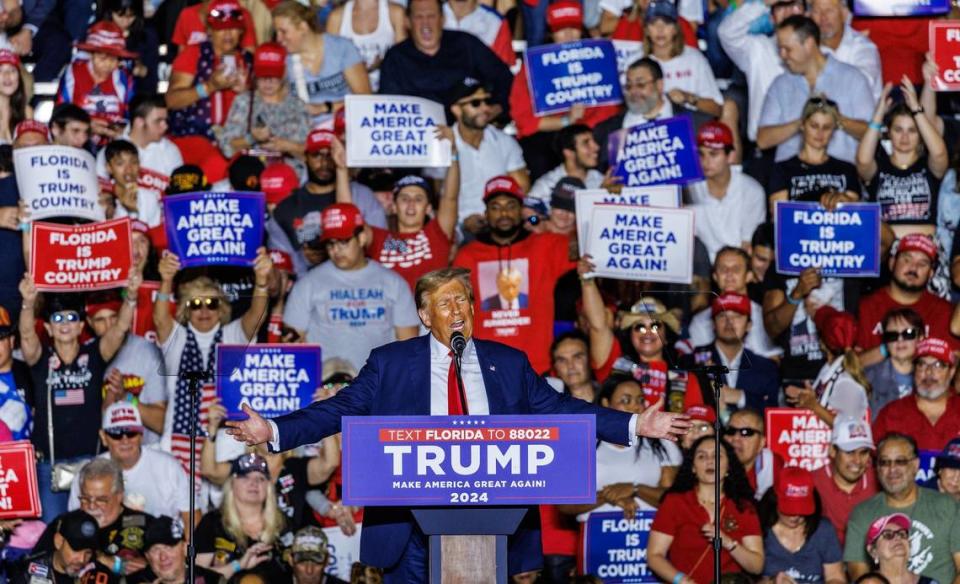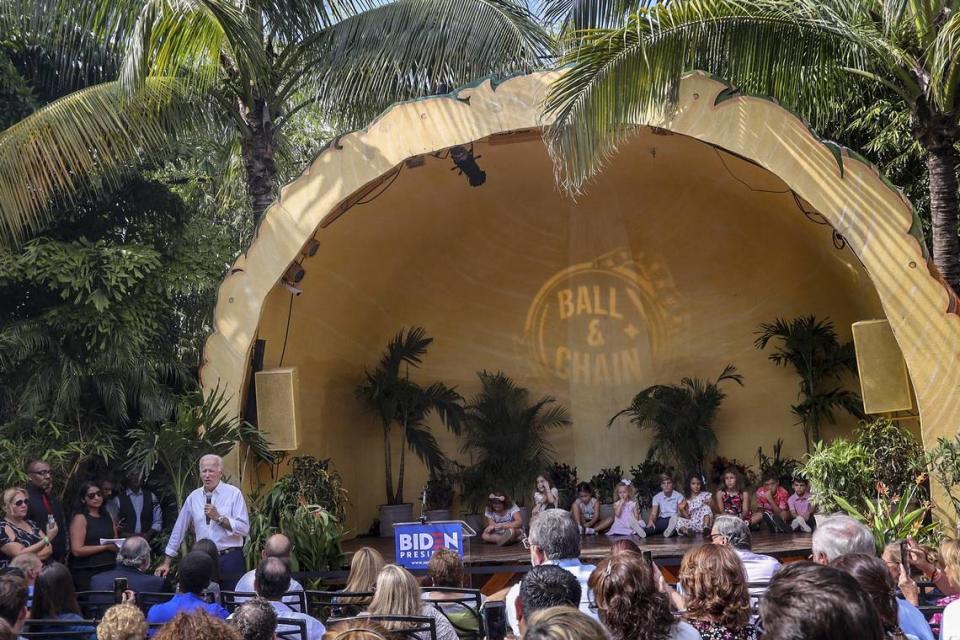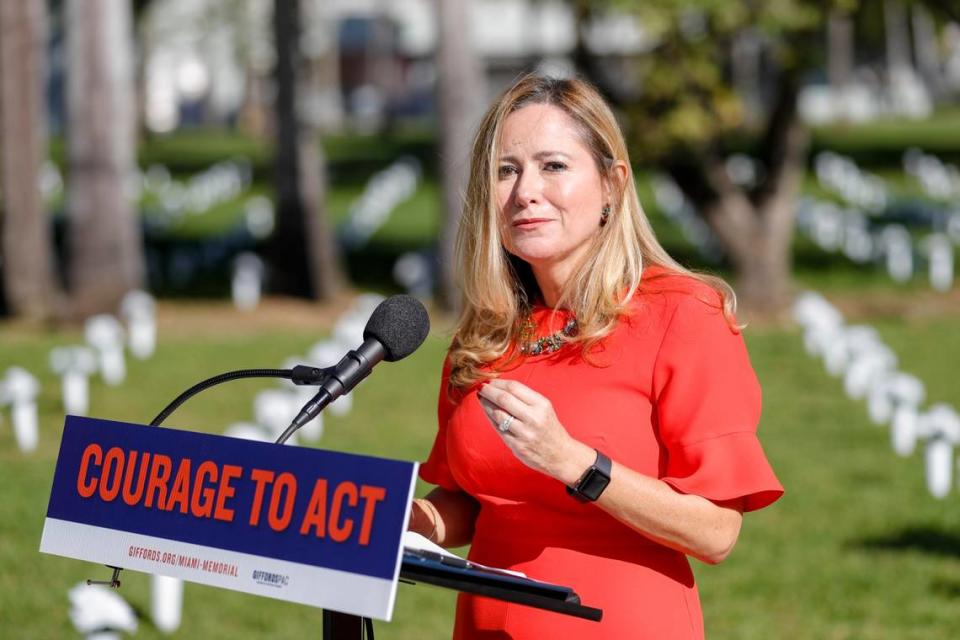This could be a big deal in November. Here’s what’s driving Hispanic voters to the right
- Oops!Something went wrong.Please try again later.
- Oops!Something went wrong.Please try again later.
With just months to go before the November elections, Republicans are bullish about Donald Trump’s prospects of further expanding his support among Hispanic voters in Miami-Dade County and Florida, building on a trend that over the last decade has pushed the state to the right.
In interviews with more than a dozen political consultants, party officials and experts, Republicans and even some Democrats described a broad realignment in Hispanic voters’ political leanings — one that goes beyond conservative-leaning Cuban Americans and largely favors the GOP and Trump.
The rightward shift could have wide-ranging repercussions this fall, when Floridians will vote for president and U.S. Senate, and Miami-Dade voters will cast ballots in races for sheriff and elections supervisor, among other contests. Were Hispanic voters to more widely embrace Republicans, it would likely take the Sunshine State out of play for Democrats entirely and possibly usher in a new era of conservative leadership in Miami-Dade.
“As far as Florida is concerned, it seems to us that there has been a political realignment, and that there is a realignment towards the Republican Party with Latinos,” said Eduardo Gamarra, the co-director of Florida International University’s Latino Public Opinion Forum.
Why are Florida’s Hispanic voters embracing Trump? Join us Thursday for a town hall at FIU
The trendline in Florida is undeniable. In 2016, Clinton defeated Trump in majority-Hispanic Miami-Dade County by over 290,000 votes. In 2020, President Joe Biden won the county, but by only 85,000 votes. In 2022, Florida Gov. Ron DeSantis became the first Republican gubernatorial candidate in 20 years to win Miami-Dade County.
Democrats say the 2022 election results were an outlier, but early 2024 polling suggests otherwise: A survey from UnidosUS and Mi Familia Vota released in November found Trump leading Biden among Florida Hispanics, 45% to 39%.
More recently, a poll of Hispanic voters in 22 states by Florida International University and the marketing firm Adsmovil found that two-thirds of Florida Hispanics believe that the U.S. is heading in the wrong direction. The poll, which was led by Gamarra, also found that more Florida Hispanics think of themselves as Republicans than Democrats.
Gamarra said that the rightward shift among Florida Hispanics is particularly pronounced “in Miami-Dade, where we see that the firm hold that the Democrats had on Hispanics in Florida seems to have given way.”

Identifying with the Trump ‘brand’
The predominance of Republican-leaning Cuban-American voters has long given the GOP a leg up in Miami-Dade County. But along with Trump’s consolidation of Cuban voters, it’s Republicans’ increasing sway with Hispanic voters from other regions that has changed the political dynamic in Florida, which lost battleground status over the last two elections.
The underlying reasons for the shift are still a topic of intense debate among political observers and party leaders, but two frequent themes emerge: Trump and Republicans have invested in years of effective political and cultural messaging, whereas Biden and Democrats haven’t put in the necessary level of manpower and resources, resulting in a loss of support and enthusiasm.
In South Florida, Republicans have launched clinics to help immigrants study for their naturalization tests. They have also used foreign policy as a tool of campaigning, speaking up against leaders in Cuba, Nicaragua and Venezuela that many Latinos who move to Florida blame for worsening conditions in their homelands.
Campaigning for re-election in 2020, former Vice President Mike Pence rolled out the Latinos for Trump initiative in Miami to mobilize Hispanic voters. Trump also launched Evangelicals for Trump at El Rey Jesus megachurch, which has a majority-Hispanic congregation, and headed to Little Havana to announce a reversal of Obama-era Cuba policies.
Former U.S. Rep. Carlos Curbelo said that Trump “goes out of his way to celebrate the country in a way a lot of Hispanics can relate to,” while the Democratic Party has embraced a “victimhood discourse” that focuses on “what Democrats consider to be fundamental injustices and structural abuses in American society.”
That doesn’t resonate with South Florida Hispanics, many of whom are immigrants who fled “difficult situations” abroad, Curbelo said, and “feel very blessed to be in the United States.”
Trump’s increasing popularity with Hispanic voters comes despite his anti-immigrant rhetoric. In his latest run for the White House, he’s vowed to do away with birthright citizenship and said that “immigrants are poisoning the blood” of the U.S.
Democrats have amplified that message to no avail: Last year during a rally in Hialeah, when Trump promised to launch the biggest deportation mission in American history if elected once again, the crowd cheered.
“I would look at culture as the explanation,” Curbelo said. “I don’t think that South Florida Hispanics have shifted very much on policy matters, but they have certainly grown to identify with Trump’s brand of Republicanism more than the newer brand of Democratic politics.”
Jaime Florez, the Hispanic communications director for the Republican National Committee, said that while Trump may not speak Spanish, he still “speaks our language.”
“He says things in the way we think about them,” said Florez.

Hispanic Democrats’ waning enthusiasm
Republicans’ Miami-Dade County resurgence isn’t just about enthusiasm for GOP politics. Voter data also reflects apathy among Hispanic Democrats and independents.
“It’s easy to think — and certainly Ron DeSantis has interpreted it this way — that there’s been a seismic shift of Hispanics voting Republicans,” said Dan Smith, a political science professor at the University of Florida. “But the fact of the matter is Hispanic Democrats and Hispanic no-party-affiliates just are not voting.”
That lack of participation, Smith said, is apparent in the large number of so-called “inactive” voters — those who have skipped the past two election cycles and failed to respond to an inquiry from their supervisor of elections.
Of the roughly 255,000 Hispanic voters who are registered as Democrats in Miami-Dade County, about 11% of them — nearly 28,000 — are considered inactive, data from January shows. Less than 6% of Hispanic Republican voters are categorized as inactive. In Broward County, nearly 1 in 5 Hispanic Democrats are inactive. In Palm Beach County, that number jumps to 1 in 4.
Democratic candidates and party officials, Smith said, are at least partially to blame for the lack of participation from their own voters, especially Hispanics.
“I think the active and inactive voters give you an idea of the challenge that Democrats have going into this presidential election,” he said. “And it’s a challenge that is not insurmountable, but it’s going to take targeted resources to get people who have been on the sidelines to re-engage.”
Fernand Amandi, a Democratic pollster who worked on Obama’s successful 2012 presidential campaign, said that instead of working to counter the GOP’s outreach efforts, Democrats by and large ceded ground to Republicans, especially in Miami-Dade County.
“The larger realignment has been accelerated by the lack of a comparable presence on the playing field by Democratic organizations and party efforts to try to maintain or regain the hold they had on Hispanic voters that they had in 2016,” he said. “They just left the playing field.”
But some Democrats say that they’re making moves to win back Hispanic voters in Florida after crushing electoral defeats in 2020 and 2022. A spokesperson for the Florida Democratic Party said that the party has begun reaching out to inactive voters over the past month to encourage them to check their voter status, and is also working to add new voters to the registration rolls in hopes of making up the gap with Republicans.
Former U.S. Rep. Debbie Mucarsel-Powell, who’s running to unseat Republican U.S. Sen. Rick Scott this year, said Democrats’ losses are reversible so long as they put in the time and resources into winning over — and turning out — Hispanic voters.

Mucarsel-Powell, the first Latina to run for the U.S. Senate in Florida as a Democrat, said that she has made a point of prioritizing Spanish-language radio and television appearances since launching her campaign last year.
She has met with Cuban-American voters over cafecitos, attended a roundtable discussion on redesignating Nicaraguans for Temporary Protected Status in the U.S. and held a video meeting with Venezuelan opposition leader María Corina Machado in December to talk about the state of democracy in Venezuela.
“I think the most important thing we can do always is be present and be exactly where our communities are and have those conversations,” she told the Miami Herald in an interview.
Christian Ulvert, a Democratic consultant in Miami who acted as an adviser for Biden’s 2020 campaign in Florida, said that unlike Hispanic voters in states like California or New York, Hispanic voters in Florida are swing voters drawn more to particular candidates and messages than any one political party.
“If we want to succeed at the ballot box, make sure you’re giving voters candidates that they’re excited about, candidates that reflect their values, candidates that can identify with those stories, who can identify with faith, family and freedom,” said Ulvert.
Yet Trump is still showing signs of strength in Miami-Dade and Florida. A poll commissioned in November by Ulvert for Miami-Dade Mayor Daniella Levine Cava’s reelection effort found Trump leading Biden among Miami-Dade voters 46% to 35%. And while Ulvert has commissioned a more recent poll showing Biden ahead of Trump, many Republicans remain confident that Trump is on track to win Miami-Dade and Florida’s Hispanic vote in November.
Kevin Cabrera, a Republican county commissioner who served as the state director of Trump’s Florida campaign in 2020, said that Democrats — and Biden, in particular — have already blown their chances with South Florida Hispanics. He predicted that Trump would carry Miami-Dade in this year’s election, becoming the first Republican presidential hopeful since George H.W. Bush in 1988 to win the county.
“I think President Trump not only wins Miami-Dade County and Florida, but he’ll be the first Republican presidential candidate to win the Hispanic vote,” Cabrera said.

